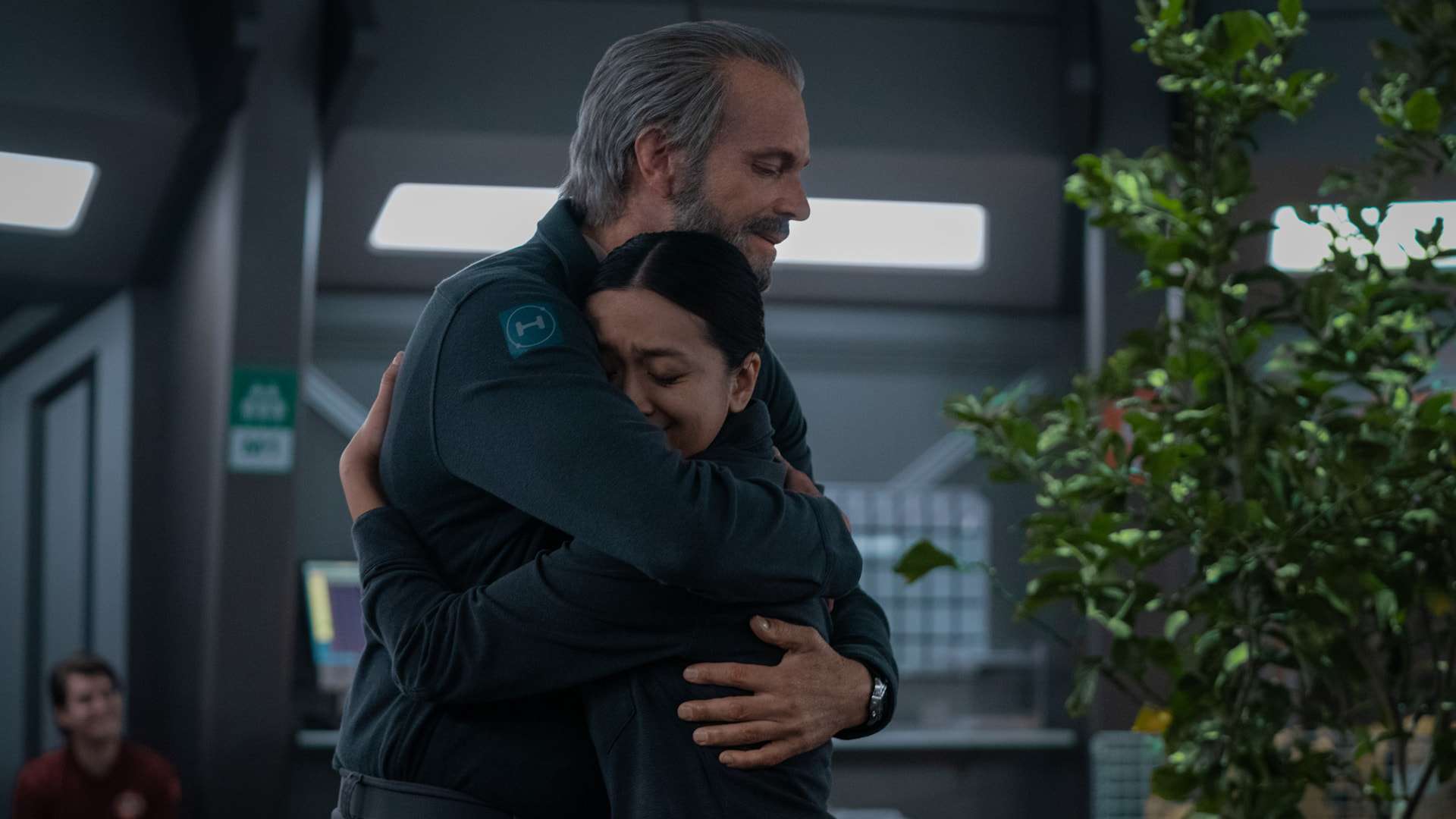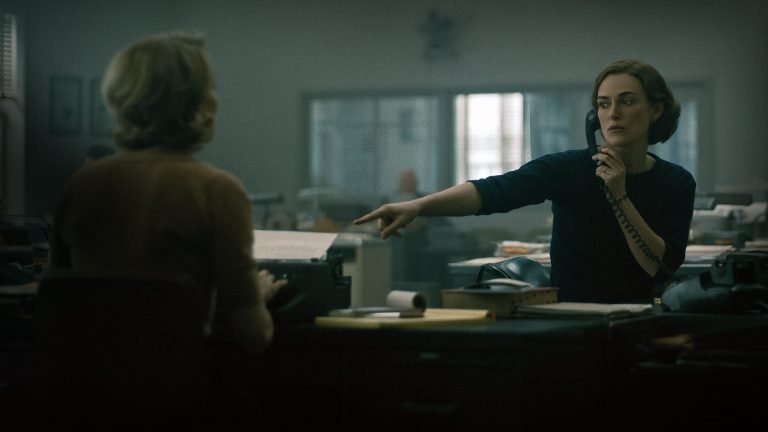For All Mankind (Season 4) Episode 7 is easily the shortest episode of this season, but it also doubles as this season’s most impactful episode precisely because of the addition of Dev Ayesa into the crucible that is the escalating conflict brewing between Helios and the astronauts at Happy Valley, further exacerbated by the political upheaval occurring back at Earth.
For All Mankind (Season 4) Episode 7 “Crossing the Line” Recap:
At Happy Valley, negotiations aren’t exactly going at the best of pace. While Massey seems like the only reasonable and confident person in the room full of negotiators on both sides of the fence—the Helios workers and the astronauts, respectively—her voice and her well-thought-out points are drowned out by the petty squabbles of both sides of the fence. The relationship on the verge of deteriorating the most seems to be Ed and Danielle’s. Ed, it seems, is hellbent on dragging this impasse as long as he can, even if his pivot into the man of the people seems oddly strange.
Danielle shares my concern because she, too, doesn’t believe in the pivoting, but her sniping and anger and her determination to stick to the company line feel oddly reductive of her character—the one who seemed at the beginning of the season to be the most empathetic of all the astronauts out there. Is the pressure to get Goldilocks getting to her? That seems more likely considering that negotiations have reached a boiling point because the workers point out that Goldilocks being redirected to Earth would take all jobs away from their end.
But because this negotiation ends with Dani’s boneheadedness of sticking to the company line and asking these workers to get back to such dangerous work with such low wages, and the workers’ disagreeing vehemently on that account, what results is a serious level of escalation. The strikers pile up all of the space suits outside on the Mars surface and use space rovers to block the airlocks. It is a grudgingly intelligent plan, according to Palmer.
In return, a team of astronauts drains water refinement pipes and then crawls over to the fuel plant via underground to gain entrance and ensure that the plant is back online. In return, though, one of the strikers manages to swipe a primary gas-flow regulator. That comes across as a snipe against the astronauts, but it becomes a problem when the astronauts (who clearly aren’t engineers) try to restart the fuel plant by trying to reconnect it through other means such that argon production resumes and the target production rate is maintained. However, that causes an explosion, an industrial disaster leading to the deaths of four astronauts.
And, of course, because this is capitalism, led by governments and organizations, accidents such as these become convenient scapegoats. The governments and administrations back on Earth take their worst impulses into account and decide that the strikers have now become terrorists. Much to the shock of Hobson and Will at NASA, the CIA deputy director lays out options for them to squash this rebellion, revealing that not only does the KGB have assets on Mars, but also does the CIA. Ironic because Roscosmos, as led by Irina with Margo at her side, is calling these a tantrum rather than the serious incident that it is.
The CIA deputy director, on the other hand, reassures them that they have access to high-pressure nitrogen bullet-containing weapons that could fire non-lethal rounds but not destroy the habitat system of Happy Valley by depressurizing them. Will tries to remind them of options to de-escalate the situation, but as it turns out, this is the only viable option for Happy Valley. How is using space guns a good idea after the debacle way back in Season 2?
I would never know, but this episode then shows the astronauts being armed with space guns, with orders from Danielle to flush out the ones responsible for this attack. This leads to those armed astronauts making unauthorized intrusions and investigations into the living quarters of the strikers, turning over the dorms and their beds. This is slowly becoming a major issue for the strikers, who are now starting to wobble in their determination to hold their ground.

Amidst this high-pressure situation comes the literal definition of oil in the flame. Dev Ayesa, as well as Kelly Baldwin and her son, arrive at Happy Valley. Dev is very much in his space-hippie mood, enjoying the view of Happy Valley and the general environment, but he is also very reticent about helping Danielle de-escalate the conflict, choosing instead to abstain. Meanwhile, the Baldwin family is on shakier ground.
While Kelly is happy to see her father, her son isn’t. He is already overwhelmed at having reached a new planet, and now he has to contend with his grandfather pretending everything is normal and having to enjoy a huge helping of Parmesan on pasta. No wonder the kid walks away without eating his food. But that trickles into the conflict between Kelly and Ed, where Kelly doesn’t exactly support her father’s perspective wholeheartedly but rather is intent on taking a big-picture view.
Back on Earth, Margo is ordered by Irina to attend the negotiations in America. She would be granted diplomatic immunity for traveling, but Margo is understandably hesitant about going, and she is forced to do so by Irina. On the other end, Aleida’s experience working with Margo in that hotel room that night has soured her expectations. It also doesn’t help that her interview at a news channel about Goldilocks dovetails into the interviewer asking questions about Margo, which she isn’t interested in answering, but when she hears that Margo would be coming down to America, her response is to curse the interviewer on live air and flip the finger. She also emphatically states to Hobson the next day that she categorically refuses to work with Margo again.
Dev Ayesa, meanwhile, finally makes his play. Crashing the meeting of the strikers at the luggage hold of Happy Valley, he tries to convince them that Goldilocks would never be sent back on its original path but redirected towards Earth because of the overall return on investment. He instead makes a deal of his own with the workers: he would give them a better pension plan, better health care, a big one-time bonus that would combine each of the workers’ salaries to the tune of millions each, and most importantly, he would ensure that the strikers would be given amnesty from any sort of repercussions to be doled out to potential terrorists.
No wonder that at the end of the argument presented, more workers were standing at the other end of the line drawn by Dev and standing with him rather than standing with Massey, Ed, and a couple of other old faithful of the strikers. I am surprised that the subplot of Ilya and the North Koreans didn’t get much focus here, but considering that this was a shorter episode, the economy of storytelling is admirable.
For All Mankind (Season 4) Episode 7 “Crossing the Line” Ending Explained:
The final twist in the episode comes, as best twists go, towards the end of the episode. Ed is at his quarters, stewing while cycling on his stamina bike, when Dev barges into his room and asks for his help. Flabbergasted, Ed logically asks why he would ever help Dev, to which Dev points out that they have the same goal. Neither of them wants to return to Earth, which is the actual reason why Ed decided to join the strikers’ union and is trying to ensure Happy Valley becomes sustainable, a goal shared by Ayesa as well because he has lost all faith in his home planet.
To that end, Dev has decided to break the strike such that the workers would be emboldened to work with his fullest zeal, and that has always been Dev’s intention because he plans to steal Goldilocks from under the noses of NASA, Roscosmos, and the M7. In short, plan an asteroid heist. This is one of the weirdest pivots in a season filled with such pivots. I have to give this show credit; it is never boring.









